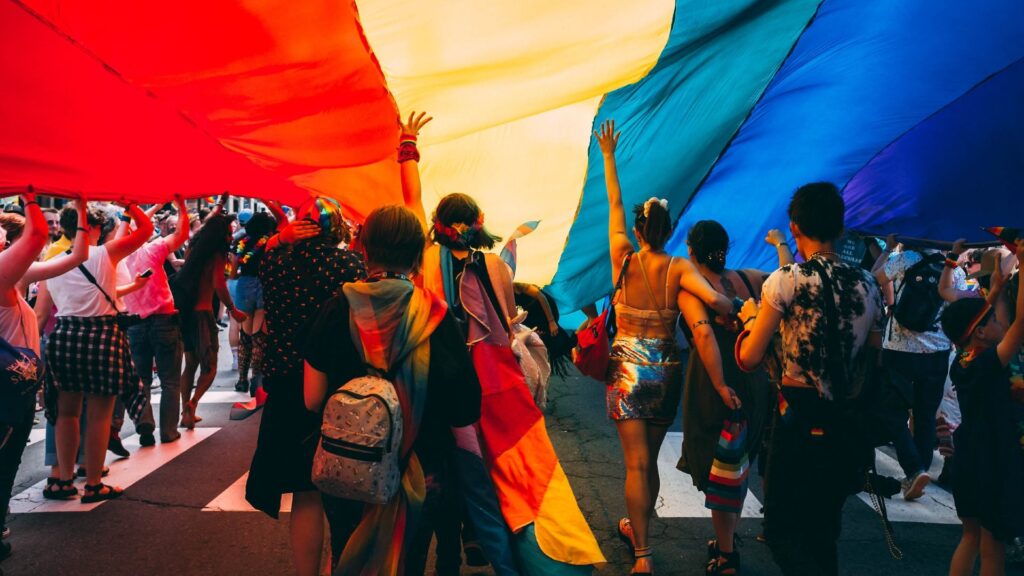Why do you make it such a big deal?

I recently saw a conversation on YouTube between Russell Brand and Jordan Peterson. Two very famous, wealthy, straight, white cis-gender (ie not transgender) men who were talking about “identity politics”. They discussed whether it’s helpful or not for people to identify themselves so strongly as things like gay, bi, trans, black or disabled, concluding of course that it is not. They focussed particularly on the triviality of “who you might want to have sex with in a given moment” and the absurdity of making that the defining feature of one’s self. Ahead of Leicester Pride this coming weekend, let’s consider this.
In a perfect world, I agree. I am many things. An IT nerd, a singer, a musician, a passionate vegan cook, a runner, a wild swimmer, a dancer, a voracious podcast listener as well as being bisexual, non-binary and transgender. Theoretically, none of those things should define me more than any others. But whereas at school my love of cookery and music were enthusiastically supported, and my abilities in IT, running and swimming were part of the curriculum, my sexuality and my gender identity could not be named or discussed. Margaret Thatcher’s Section 28 forbade discussion of such things in schools until 2003, so I was left feeling confused and alone. Conversely, Romeo and Juliet, the story of a grown man having a fling with a young teenage girl was, and is, studied by most schoolchildren in the UK. Straight sexuality is plastered storeys high across billboards and adverts, TV and film. But even with the progress we have seen, other forms of sexuality remain risqué and something to keep away from the innocent eyes and ears of children.
If today I travelled to Uganda, it would not be my love of podcasts that could see me beaten, arrested, jailed, legally executed or simply thrown from a building, but my love of anyone who happened to have the same genitalia as me. Try telling the authorities there that my sexuality doesn’t define me (it is crucial to remember that many of the countries that currently have the worst LGBT rights are former colonies of Western European nations that exported their homophobia and associated laws when they stole those lands).
Even in the UK where LGBT rights and freedoms are relatively good, with an emphasis on the “relatively”, I am less physically safe because of my sexuality and my gender identity and presentation than I should be. I am still risking my safety to show affection to certain people, and I invite aggression, derision, and comments from people because of the way I look. In other European nations such as Poland and Hungary, populist governments are more actively demonising those who are LGBT+ because marginalised minorities have always proved useful scapegoats for the problems people are facing. Many areas of Poland have been declared “LGBT-free zones” – sending a threatening message to their queer citizens that they are unwelcome because of their sexuality and gender identity.
Queer people are still routinely closeted at work, especially in careers working with children or vulnerable adults, because of a legacy of being regarded as sexual deviants and perverts. They are even still hounded out of such jobs if their identities become known. Something that doesn’t tend to happen because of an interest in crochet or tennis, or because of the colour of someone’s hair. Tell those whose careers and lives have been ruined that their sexuality shouldn’t define them, despite what it has cost them.
So no, we should not have to identify so strongly with our sexuality, gender identity, or gender presentation. Just as people should not have to identify so strongly with their race, another category invented to put people into hierarchies of power, or as disabled, or chronically ill. We don’t choose to foreground these identities, but they are the aspects of us used to marginalise, exclude, and denigrate our humanity, and while that remains true, those parts of our identities dominate our lives and therefore who we are. And it is those elements of who we are, that we are constantly forced to defend.
I would love for my gender identity to be about as central to my identity as my blood type (I have a blood type, I have no idea what it is, and may well die without having given it much thought). I would love for my choice of sexual partners to be of as much interest to the rest of the world as my choice of toothpaste, but it is not. And the moral panic around the topic in both traditional and new media shows no signs of dying down. Not while “won’t somebody think of the children and stop the drag queens” makes such an excellent distraction from the things actually threatening future generations. Tackling real issues such as climate change, job insecurity, unaffordable housing and the worsening health outcomes which are likely to produce the first generation ever to die earlier than their parents, would be a far better way to protect the children. But that would demand complex, systemic change, and it has always been easier to distract people with a fear of minorities, whether they’re gay, trans, Jewish, or refugees in small boats.
David Wilson
Application Support Manager (IT Services)
Equity, Diversity and Inclusion
Reflections, comments, discussion and opinion on EDI topics from Loughborough University staff and students